The Grand Ole Opry (24 page)
Read The Grand Ole Opry Online
Authors: Colin Escott

JACK D
E
WITT:
Jim Denny’s main objective was to take over the Grand Ole Opry. He was always running me and other people down. He thought
he had enough strength to take it over, and I think he wanted to force me out. He was a strange man. A tough character. He
had the worst rug, hairpiece, of any that I’ve ever seen, and he also carried a pistol, an automatic revolver. The big blowup
came when I went to our board of directors and Edwin Craig, and they said, “You need to tell him that you will raise his salary
to a certain figure if he will stay and run it for us, but if he’s not interested, just fire him.”
MARIE CLAIRE,
Jim Denny’s assistant:
Denny had met with DeWitt two or three times about Cedarwood, and had been warned to sell it or leave WSM. Denny came in late
the morning it all happened. As soon as he got in, DeWitt wanted to see him.
JACK D
E
WITT:
I brought Denny into my office and told him, “Jim, we’ve got a choice for you. You can stay with WSM, which we’d like for
you to do. We will raise your salary [if] you devote your entire time to WSM and the Artists Service Bureau, and making money
for WSM and managing the artists so that they are happy with WSM.” He said, “I don’t want to do that.” I said, “Well, Jim,
I’m sorry, but we can’t do otherwise.” He said, “You’ll have to fire me.” He wouldn’t even discuss the higher salary we were
offering him.
MARIE CLAIRE:
Denny never returned to his office. He went straight to Cedarwood [one block away]. He came in a few hours later, gathered
his things. He said simply, “DeWitt let me go.”
KEN MARVIN,
George Morgan’s sideman:
I saw Jim standing in the elevator just as the door closed. All he was carrying under his arm was his
Billboard
Man of the Year award.
JIM DENNY:
It’s a strictly personal matter between DeWitt and myself in which DeWitt feels that no employee of the station should be
better off financially than himself. DeWitt feels that when he makes decisions, whether they are right or wrong, no one should
contest them. I know I shall be much happier as an independent operator than being handicapped by working under the supervision
of someone who knows nothing about the country music business.
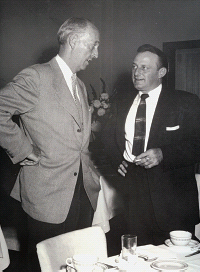
Both artist manager Hubert Long (left) and Jim Denny (right) encouraged Opry acts to leave the show.
JACK D
E
WITT:
He tried to take over [the management and booking of] Roy Acuff, who wouldn’t go with him. He tried to take over Ernest Tubb,
who wouldn’t go with him. He did take over Minnie Pearl, and I’ve never forgiven her. We brought in D. Kilpatrick, who was
the first independent manager of the Opry. Denny thought he was the manager of the Opry, but he wasn’t.
Walter D. Kilpatrick, known simply as “D.,” was a tough-talking former Marine who’d been Capitol Records’ first Nashville
producer. He had just left Mercury Records when Jack DeWitt approached him. Jim Denny didn’t leave the Opry alone, though.
He promptly started the Denny Talent Agency and recruited several Opry stars, including Carl Smith and Little Jimmy Dickens,
for a show he was assembling on behalf of Philip Morris. Structured like the Camel Caravan, the Philip Morris Caravan toured
the United States for eighteen months.
LITTLE JIMMY DICKENS:
Jim took some of the [Opry] talent with him. I checked with [my manager] and we studied it over, and he—not me—decided that
it wouldn’t be feasible for the deal we had with Philip Morris for me to stay with the Opry. He thought that when we were
through, we could come back to the Opry, so I took his and Mr. Denny’s advice. But it didn’t work out that way. Once I took
that show, that cooled it for me with the Opry.
The lingering bitterness from Denny’s departure meant that Jimmy Dickens wouldn’t rejoin the Grand Ole Opry until 1975, almost
twenty years later. Encouraged by the success of “Heartbreak Hotel,” Jack Stapp left WSM and the Opry in July 1957. Meanwhile,
Red Foley’s
Ozark Jubilee
was posting excellent ratings on Saturday night . . . the Opry’s night. Denny’s successor, D. Kilpatrick, had to recruit
artists to replace those who’d defected, and address the problem of declining attendance.
D. KILPATRICK:
Rock ’n’ roll was the enemy, and I do mean the enemy. At the time Presley hit, we couldn’t draw breath in the auditorium.
We couldn’t draw nothin’. I remember addressing a group of women voters and telling them that rock ’n’ roll was the devil’s
workshop. I thought it was then, and I know for a damn fact it is now. The problem was that the country guys began sounding
like the pop guys, and it got so you’d need a computer program to tell the difference. I didn’t want to compete with rock
’n’ roll or pop music. I said, “Let’s do it our way, then we got something very distinct to sell.” And yes, I’m the son of
a bitch that wouldn’t let them bring drums on the Opry stage. It was the principal instrument in rock ’n’ roll. Why take the
thing that’s killing you and give in to it?
STONEWALL JACKSON,
Opry star:
At the Ryman, you’d only have a few rows of people up front. This really hurt Ernest Tubb. It hurt him deep. He was like a
man grieving, like he’d had a couple of kids die. The gravy got a bit thin there. It was the lowest ebb I’ve ever seen country
music at. When Presley hit, it just preempted country to the lowest amount I’ve ever seen it preempted.
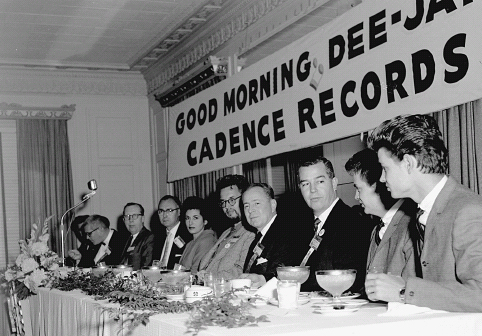
D. Kilpatrick and the Everly Brothers at the 1958 Disc Jockey Convention. From right: Don Everly; Phil Everly; Kilpatrick;
Ott Devine of WSM; songwriters Boudleaux and Felice Bryant (who’d written several of the Everlys’ greatest hits, including
“Bye, Bye Love” and “Wake Up, Little Susie”); Archie Bleyer, president of Cadence Records; and Jack DeWitt of WSM.
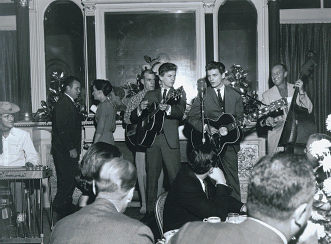
The Everly Brothers playing at the Disc Jockey Convention.
GRANT TURNER:
One Saturday night around Christmas, there was hardly anyone there. All the stars were home for Christmas, but no one was
at the show to see ’em. I was worried about the Opry then.
The closest D. Kilpatrick came to rock ’n’ roll was the Everly Brothers. Although they were only in their early twenties,
the Everlys had been performing on country radio for more than ten years, and for a long time, they were the only successful
rock ’n’ roll act managed and produced in Nashville. Their country pedigree was just long enough to satisfy Kil-patrick.
BILL ANDERSON:
My mom and dad came to a convention in Nashville in 1958. It had been four or five years since they’d been there, when it
was wall-to-wall people. They came back and told me that they’d been by the Opry on Saturday night, and they’d stuck their
heads in the door, and they were amazed. It wasn’t even half full. They said, “While we were standing there, a whole bunch
of people came streaming in the door. They poured out of the little shops up and down Broadway and came running and screaming
and standing at the door.” It was because they’d introduced the Everly Brothers. My mom and dad said those people stood there
and screamed while the Everly Brothers were onstage, and as soon as they went off, these people left. I remember getting a
call from Hank Snow’s manager asking me if I wanted to book him. He was coming through Commerce, Georgia, where I was a deejay.
I thought, Goodness, we’re probably talking thousands and thousands of dollars. His manager said, “I can let you have Hank
and the band at a real good price.” I said, “How much?” He said, “Two hundred and fifty guarantee.” I was stunned, but that
was the real low ebb.
HAL SMITH,
Ernest Tubb’s booking agent:
Things were on the decline, not to where we were starving, but certainly not doing as well as we had. TV was red-hot all of
a sudden. Ernest came out to the office and we talked everything over. We came this close to concluding that the best thing
to do was get out of the business. His brother was in the insurance business in Texas then, and Ernest said, “I could go into
business with Bud, but this is all I’ve ever done.” It was so sad.
Country music survived and prospered again, but the Opry’s older stars, like Ernest Tubb and Roy Acuff, were sidelined. Eventually,
they would be recognized as the music’s elder statesmen, but in the 1950s they had to contend with lower personal appearance
fees and lower record sales. The Opry itself had to walk a fine line between bringing in some of the newer stars that younger
listeners wanted to hear without alienating the older audience.
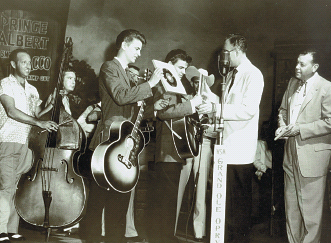
Archie Bleyer, president of Cadence Records, presents the Everly Brothers with a gold record, while the Opry’s Grant Turner
looks on.
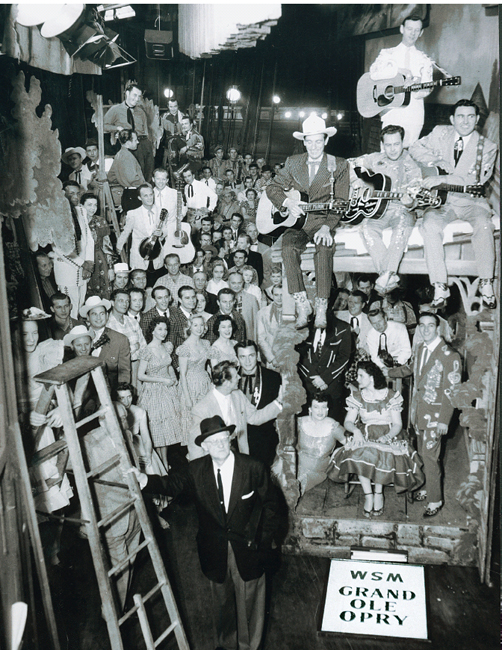
SURVIVING NASHVILLE
R
eplacing departed cast members, D. Kilpatrick kept it country. In November1956, he signed an artist who accomplished something
that no one had accomplished since the show’s earliest days, and someone who definitely kept it country.